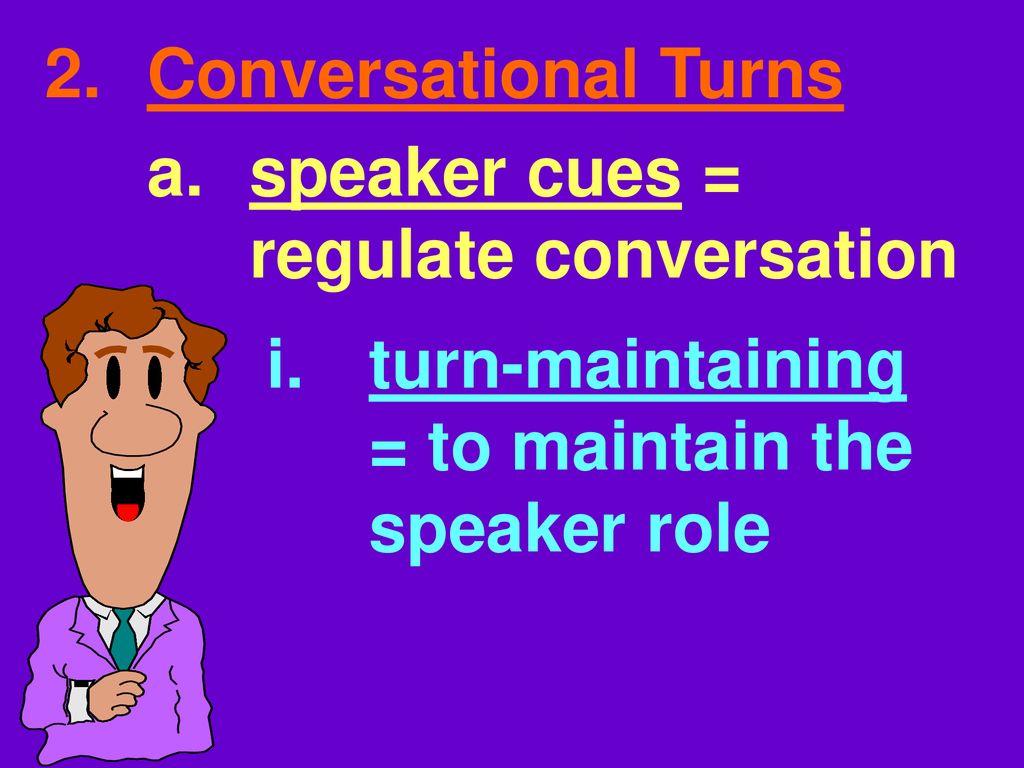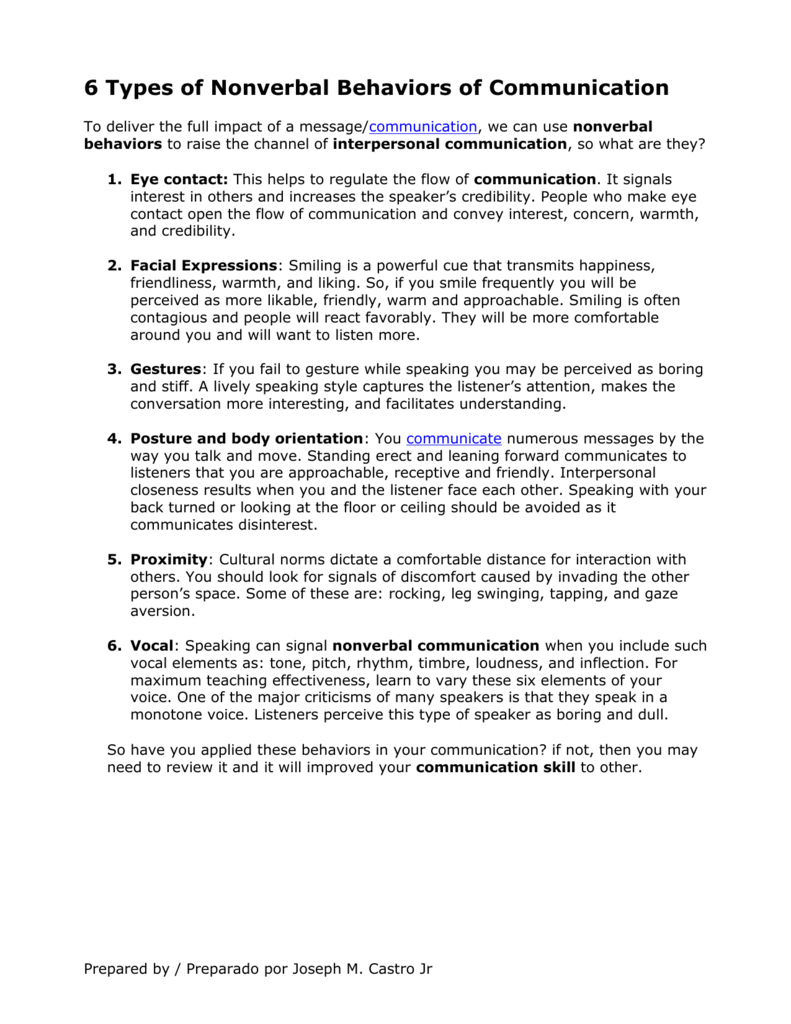Listeners Regulate the Conversation by Using Which Types of Cues
Turn taking is regulated by both audio and visual signals during hearing people. Turn maintaining and turn yielding.

Solved 1 Which Of The Following Is Not Way In Which Several Chegg Com
There are a few general listening styles that people use depending on the situation they are in and whether they are operating on a more emotional.

. View the full answer. Listeners regulate the conversation by using three types of cues. Answer choices in this exercise appear in a different order each time the page is loaded.
The use of strong authoritative language. Turn-requesting cues turn-denying cues and back channeling cues and interruptions. We review their content and use your feedback to keep the quality high.
Eye contact touch hand gestures head nods or. How to prevent others from speaking. Turn-requesting turn-denying backchanneling and interruptions.
Which choice below is one of those cues. The ways listeners can regulate the conversation by using three types of cues. View mc110_lecture9doc from hmc fdhcm001 at help university.
Listeners regulate the conversation by using three types of cues including _____ cues. Videotapes of seven dyadic conversations in japanese were transcribed and analyzed for regulator behaviors. Turn-taking cues are a type of.
Control of listeners responses. It includes a combination of many aspects of body language such as. Throughout the speakinglistening process both speaker and listener exchange cues for what are called conversational turns Link will open in this tab Links to an.
Turn-requesting cues These cues let the speaker know that you have something to say and take turn as the speaker. Turn-maintaining cues and turn-yielding cues. Turn-requesting lets the speaker know youd like to say something 6.
Asked Dec 23. We use an experimental protocol to test whether listeners perception of trouble in interaction eg disagreement or unwillingness varies when prosodic cues are. Let s take a closer look at conversational turns in terms of the examples used by speakers and the references used by listeners.
Speakers regulate the conversation through two-major types of cues. Listener cues- as a listener you can regulate the conversation using 3 types of cues. Regulators are a collection of expressions and gestures that help us control and understand conversations better.
GET 1032 Topic 8. Unsupportive attempts to take over the role of speaker often to. Learning critical listening skills is an important part of building interpersonal relationships and processing important information.
Interpersonal relationship_ conversation sulay jalloh 1 interpersonal communication conversation i. Regulators like illustrators Opens in new window are related to the conversation but while the illustrators are specifically interlaced with the moment-to-moment fluctuations in. Asked Mar 23 2017 in Communication Mass Media by Aisha92.
The listener might use a signal such as a hand raise or by vocalizing something such as Id like to say something. The ways in which listeners can re. Listeners regulate the conversation by using three types of cues.
Conversation control teaches us. Regulators Functions of Regulators in Communicative. Turn denying indicates your reluctance to.
How Listening Styles Help You Communicate. 7 Types of Listening. Turn-requesting turn-denying backchanneling and interruptions.
Listeners regulate the conversation by using which types of cues. Regulators in Japanese Conversation. Speaker Cues As a speaker you regulate conversation through two major types of cues.
Which choice below is one of those cues. View GET1032 Topic 8 Interpersonal messagedocx from GET 1032 at National University of Singapore. Listeners regulate the conversation by using three types of cues.
In order for one to assume the speakers turn one might use turn-requesting cues. These cues let the speaker know that you have something to say and take turn as the speaker. The ways listeners can regulate the conversation by using three types of cues.
Experts are tested by Chegg as specialists in their subject area. Turn-requesting turn-denying backchanneling and interruptions 5. Regulators are nonverbal acts which sustain and regulate the back-and-forth nature of speaking and listening between two or more interactants.
Speakers often use verbal cues to elicit a response from the listener but some verbal cues are easier to catch than others.

Solved 1 Which Of The Following Is Not Way In Which Several Chegg Com

Pdf Influence Of Turn Taking In A Two Person Conversation On The Gaze Of A Viewer

Turn Taking And The Local Management Of Conversation In A Highly Simultaneous Computer Mediated Communication System Language Internet

Conversation Interpersonal Communication Principles Of Conversation Conversation Talking With Another Person Seems So Simple And So Natural That Course Hero

Turn Maintaining Cues And Turn Yielding Cues 2 Turn Maintaining Cues Can Course Hero

Turn Maintaining Cues And Turn Yielding Cues 2 Turn Maintaining Cues Can Course Hero

Comm 145 Test 3 Review Other Quizizz

Solved 16 In This Stage Of The Process Of Conversation We Chegg Com

6 Types Of Nonverbal Behaviors Of Communication September 19

Turn Taking And The Local Management Of Conversation In A Highly Simultaneous Computer Mediated Communication System Language Internet

Messages Conversation Ppt Download

Solved 1 Which Of The Following Is Not Way In Which Several Chegg Com

Examples Of Interactive Gestures Used To Regulate Turn Taking Download Scientific Diagram

Turn Maintaining Cues And Turn Yielding Cues 2 Turn Maintaining Cues Can Course Hero

Turn Taking And The Local Management Of Conversation In A Highly Simultaneous Computer Mediated Communication System Language Internet

Turn Maintaining Cues And Turn Yielding Cues 2 Turn Maintaining Cues Can Course Hero

Com1010 Chapter 7 Quiz Written Jun 20 2019 10 27 Pm Jun 20 2019 10 41 Pm Submission View Studocu

Turn Maintaining Cues And Turn Yielding Cues 2 Turn Maintaining Cues Can Course Hero

Turn Taking And The Local Management Of Conversation In A Highly Simultaneous Computer Mediated Communication System Language Internet
Comments
Post a Comment